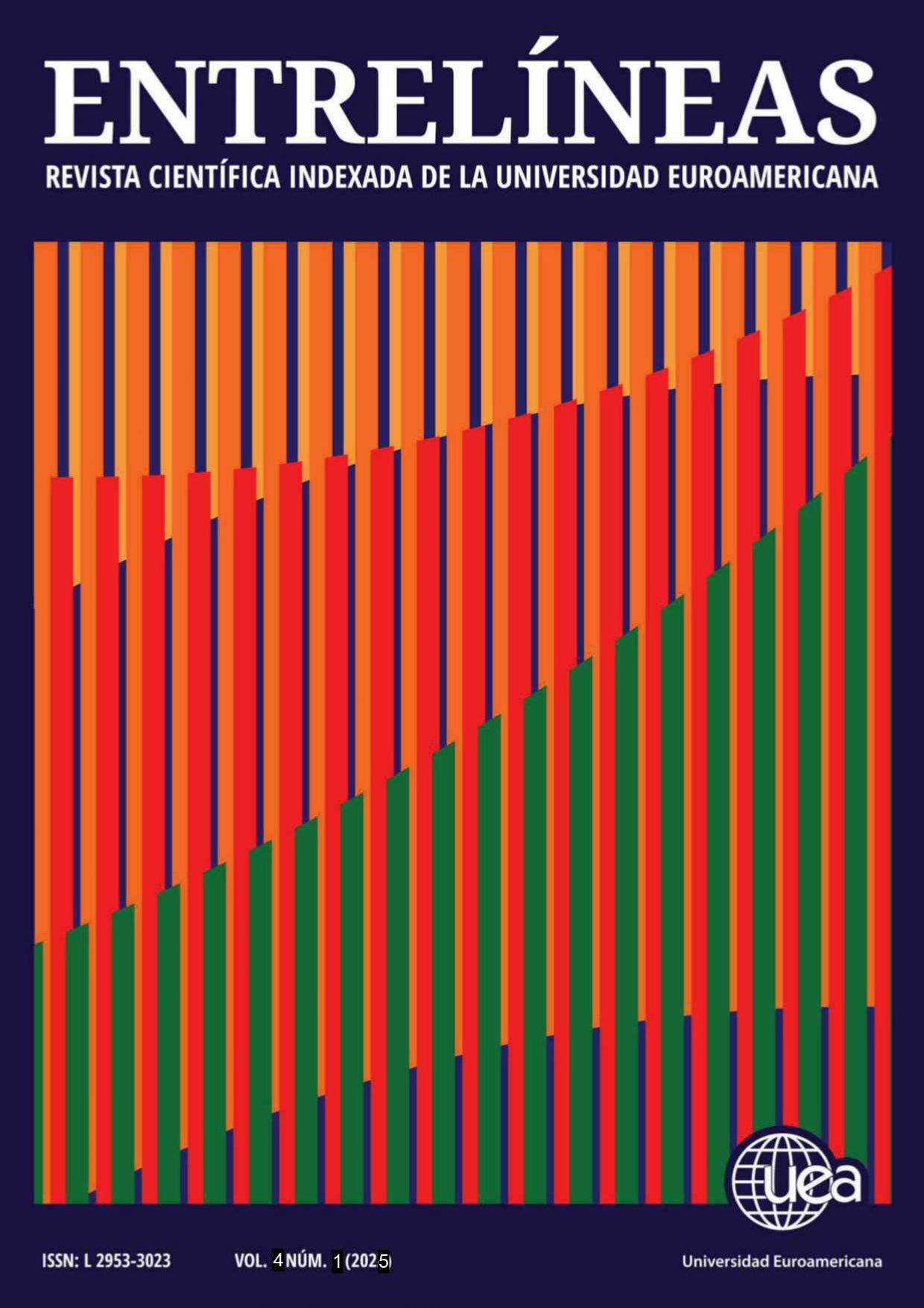Diagnóstico de competencias en lectura y matemáticas en estudiantes de una escuela primaria de Texas
DOI:
https://doi.org/10.56368/Entrelineas415Palabras clave:
enseñanza centrada en el rendimiento, enseñanza individualizada, lectura, matemáticas, plan de estudiosResumen
Con el objetivo de diagnosticar el nivel de competencia en lectura y matemáticas de los estudiantes de 3º a 5º grado al inicio del año escolar 2023-2024, en una escuela primaria de Texas, este estudio examinó el uso de la planificación sistemática. Se utilizó la evaluación adaptativa iReady para diagnosticar el nivel académico al inicio del año, complementado con encuestas aplicadas a docentes sobre percepciones y prácticas pedagógicas. Los resultados mostraron diferencias significativas en 3º grado, donde solo 3 estudiantes demostraron dominio en matemáticas; en 4º, apenas 12 lo lograron en lectura; y en 5º, solo 13 estudiantes alcanzaron el nivel esperado en ambas áreas. La mayoría del alumnado presentó niveles de desempeño muy por debajo del grado cursado. Los docentes valoraron positivamente la planificación basada en datos, aunque expresaron limitaciones en tiempo, capacitación tecnológica y recursos diferenciados. Se concluye que la planificación sistemática y el uso pedagógico de datos son necesarios para tratar los déficits académicos, pero su efectividad depende del acompañamiento institucional y el desarrollo profesional docente. Estos resultados refuerzan la necesidad de intervenciones estructuradas y sostenidas en contextos con amplias disparidades educativas.
Descargas
Referencias
Anderson, E. (2025, 1 febrero). Texas Students’ Test Scores Shrink as Spending Grows. Texas Scorecard. https://n9.cl/yv3is
Binkley, C. (2025). Test scores show schools further behind in reading, math | AP News. AP News. https://n9.cl/pwqvl
British Educational Research Association (2018). Ethical guidelines for educational research. https://n9.cl/ycxjl
Comte, A. (1875). The Positive Philosophy of Auguste Comte. Books on Demand.
Curriculum Associates. (2011). Creators of iReady Curriculum Associates. https://n9.cl/wkn6v
Descartes, R. (2008). Discourse on the Method. Cosimo, Incorporated.
Dillard, L. (2018). Improving instructional practice through instructional coaching (Doctoral dissertation). South Carolina University. https://n9.cl/hzfpm
Freire, P. (1993). Pedagogy of the oppressed. Continuum.
García, T. L. (2019). Increasing phonemic awareness in intellectually impaired students by using Wilson’s Fundations Phonics Program in a self-contained classroom (Doctoral dissertation). University of South Carolina. https://n9.cl/l83f6
Gardner, H. (1993). Multiple intelligences: the theory in practice. Basic Books.
Habermas, J. (2015). The Theory of Communicative Action: Reason and the Rationalization of Society, Volume 1. Polity Press.
Hunter, C. (2019). The effect of cognitive coaching on high school English teachers’ implementation of metacognitive reading strategies (Doctoral dissertation). University of South Carolina. https://n9.cl/4xc450
Instituto Internacional de Planeamiento de la Educación & UNESCO. (2019). Plan estratégico de educación 2019-2024: políticas educativas en acción. https://n9.cl/3gly3
Kant, I. (2007). Lectures on Pedagogy (P. Heath, Ed. & R. B. Louden, Trans.). Cambridge University Press.(Original work published 1803)
Kant, I. (1998). Critique of pure reason. Cambridge University Press.
Marzano, R. J. (2000). Transforming Classroom Grading. Association for Supervision and Curriculum Development.
Marzano, R. J. (2001). Designing a new taxonomy of educational objectives. Corwin Press.
Marzano, R. J. (2007). The art and science of teaching: A comprehensive framework for effective instruction. ASCD.
Marzano, R. J. (2003). What Works in Schools: Translating Research into Action. Association for Supervision and Curriculum Development.
Oliveira, A. (2025). Damning nationwide test shows US kids’ reading levels plummeted to lowest level in 32-year history — and Republicans are blaming «woke» education. New York Post. https://n9.cl/4vkpr
Phillips, C. (2025, 25 January). Texas scores poorly on the Nation’s Report Card; reading scores lowest in decades. Texas Standard. https://n9.cl/wx6pu
Popham, W. J. (2014). Formative assessment: Improving pedagogy and student outcomes. Theory Into Practice, 53(2), 137-143. https://doi.org/10.1080/00405841.2014.887865
Popper, K. R. (2002). The Logic of Scientific Discovery. Routledge.
Rayo-Garza, C., & Rayo-Garza, C. (2024). 2024 Kids Count National Data Book: Texas Still fails its children - every Texan. Every Texan. https://n9.cl/bab8k
Schildkamp, K., Van Der Kleij, F., Heitink, M. C., Kippers, W. B., & Veldkamp, B. P. (2020). Formative assessment: A systematic review of critical teacher prerequisites for classroom practice. International Journal of Educational Research, 103, 101602. https://doi.org/10.1016/j.ijer.2020.101602
Sousa, D. A., & Tomlinson, C. A. (2018). Differentiation and the brain: How neuroscience supports the learner-friendly classroom. In ASCD solution trees publications.
Texas Education Agency. (2023). Texas Academic Performance Report. https://n9.cl/kcutwy
Tomlinson, C. A. (2001). How to differentiate instruction in mixed-ability classrooms (2nd ed.). Association for Supervision and Curriculum Development.
Vygotsky, L. S., & Cole, M. (1978). Mind in society: Development of Higher Psychological Processes. Harvard University Press.
Descargas
Publicado
Número
Sección
Licencia

Esta obra está bajo una licencia internacional Creative Commons Atribución-NoComercial 4.0.
Usted es libre de:
- Compartir — copiar y redistribuir el material en cualquier medio o formato
- Adaptar — remezclar, transformar y construir a partir del material
- La licenciante no puede revocar estas libertades en tanto usted siga los términos de la licencia
Bajo los siguientes términos:
- Atribución — Usted debe dar crédito de manera adecuada , brindar un enlace a la licencia, e indicar si se han realizado cambios . Puede hacerlo en cualquier forma razonable, pero no de forma tal que sugiera que usted o su uso tienen el apoyo de la licenciante.
- NoComercial — Usted no puede hacer uso del material con propósitos comerciales .
- No hay restricciones adicionales — No puede aplicar términos legales ni medidas tecnológicas que restrinjan legalmente a otras a hacer cualquier uso permitido por la licencia.










